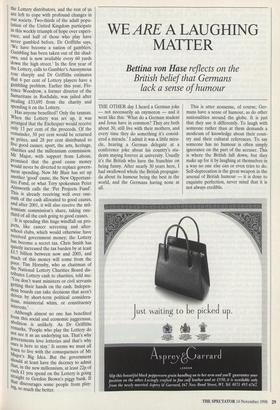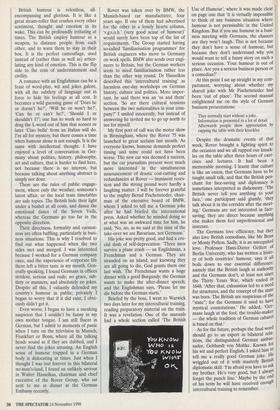WE ARE A LAUGHING MATTER
Bettina von Hase reflects on the British belief that Germans lack a sense of humour THE OTHER day I heard a German joke — not necessarily an oxymoron — and it went like this: 'What do a German student and Jesus have in common? They are both about 30, still live with their mothers, and every time they do something it's consid- ered a miracle.' I admit it was a little mira- cle, hearing a German delegate at a conference joke about his country's stu- dents staying forever at university. Usually it's the British who have the franchise on being funny. After nearly 30 years here, I had swallowed whole the British propagan- da about its humour being the best in the world, and the Germans having none at all. This is utter nonsense, of course; Ger- mans have a sense of humour, as do other nationalities around the globe. It is just that they use it differently. To laugh with someone rather than at them demands a modicum of knowledge about their coun- try and their cultural references. To say someone has no humour is often simply ignorance on the part of the accuser. This is where the British fall down, but they make up for it by laughing at themselves in a way no one else can or even tries to do. Self-deprecation is the great weapon in the arsenal of British humour — it is done to exquisite perfection, never mind that it is not always credible. British humour is relentless, all- encompassing and glorious. It is like a great steam-roller that crushes every other sentiment, thought and emotion in its wake. This can be profoundly irritating at times. The British employ humour as a weapon, to distance people from each other, and to warn them to stay in their box. It is the perfect camouflage, used instead of (rather than as well as) articu- lating any kind of emotion. This is the flip side to the coin of understatement and civility.
A romance with an Englishman can be a feast of word-play, wit and jokes galore, with all the subtlety of language out in force to hide his feelings at all cost. It becomes a wild guessing game of 'Does he or doesn't he?', 'Will he or won't he?', `Can he or can't he?', 'Should I or shouldn't I?'; one has to work so hard to drag the L-word out of him that sooner or later 'Ciao bella' from an Italian will do. I'm all for mystery, but there comes a time when humour alone is not enough. It is the same with intellectual thought. I have enjoyed a level of conversation in Ger- many about politics, history, philosophy, art and culture, that is harder to find here, not because there is no interest, but because talking about anything abstract is simply not done.
These are the rules of public engage- ment, where only the weather, someone's latest affair, or the local train timetables are safe topics. The British hide their light under a bushel at all costs, and dance the emotional dance of the Seven Veils, whereas the Germans go too far in the opposite direction.
Their directness, formality and earnest- ness are often baffling, particularly in busi- ness situations. This is why I resolved to find out what happened when the two sides met and merged. I was interested because I worked for a German company once, and the experience of corporate life there left a bitter taste in my mouth. Gen- erally speaking, I found Germans in offices strident, serious and rude; no grace, sub- tlety or manners, and absolutely no jokes. Despite all this, I valiantly defended my country's humour in public; privately I began to worry that if it did exist, I obvi- ously didn't get it.
Even worse, I began to have a sneaking suspicion that I couldn't be funny in my own mother tongue. I am still fluent in German, but I admit to moments of panic when I turn on the television in Munich, Frankfurt or Bonn, where all the talking heads sound as if they are dubbed, and I never find the jokes amusing. An English sense of humour trapped in a German body is dislocating at times. Just when I thought I was lost forever in this bilateral no-man's-land, I found an unlikely saviour in Walter Hasselkus, chairman and chief executive of the Rover Group, who sat next to me at dinner at the German Embassy recently. Rover was taken over by BMW, the Munich-based car manufacturer, four years ago. If one of them had advertised for the other in a lonely hearts column, `v.g.s.o.h.' (very good sense of humour)' would surely have been top of the list of requirements. The Group started having so-called 'familiarisation programmes' for British engineers who move to Germany on work spells. BMW also sends over engi- neers to Britain, but the German workers seem to need familiarisation rather less than the other way round. Dr Hasselkus described this 'intercultural training' as harmless one-day workshops on German history, culture and politics. More impor- tant, he said there was an 'us and them' section. 'So are there cultural tensions between the two nationalities in your com- pany?' I smiled innocently, but instead of answering he invited me to go up north to see for myself.
My first port of call was the motor show in Birmingham, where the Rover 75 was launched to great acclaim last month. As everyone knows, humour demands perfect timing and mine could not have been worse. The new car was deemed a success, but the car journalists present were much more interested in the simultaneous announcement of drastic cost-cutting and redundancies at Rover — imminent reces- sion and the strong pound were hardly a laughing matter. I will be forever grateful to the mighty Bernd Pischetsrieder, chair- man of the executive board of BMW, whom I asked to tell me a German joke after he had briefed the international press. Asked whether he minded doing so at what was an awkward time for him, he said, 'No, no, as we said at the time of the take-over we are Bavarians, not Germans.'
His joke was pretty good, and had a cru- cial dash of self-deprecation: 'Three men survive a plane crash — an Englishman, a Frenchman and a German. They are stranded on an island, and knowing they are all going to die, God grants them one last wish. The Frenchman wants a huge dinner with a good Burgundy; the German wants to make the after-dinner speech; and the Englishman says, 'Please let me die before the German starts.'
Briefed by the boss, I went to Warwick two days later for my intercultural training, reading preparatory material on the train. It was a revelation. One of the manuals had a whole section called 'The British Use of Humour', where it was made clear on page one that 'it is virtually impossible to think of any business situation where humour is not permissible in the United Kingdom. But if you use humour in a busi- ness meeting with Germans, the chances are they won't laugh. This is not because they don't have a sense of humour, but because they don't understand why you would want to tell a funny story on such a serious occasion. Your humour is out of place. Are you a serious business person or a comedian?'
At this point I sat up straight in my com- partment, worrying about whether my shared joke with Mr Pischetsrieder had been 'out of place'. The second manual enlightened me on the style of German business presentations:
They normally start without a joke. Information is presented in a lot of detail Afterwards people show appreciation by rapping the table with their knuckles
Despite the dramatic events of that week, Rover brought a fighting spirit to the occasion and we all rapped our knuck- les on the table after three hours of exer- cises and lectures. It had been a memorable morning. I learnt that culture is like an onion, that Germans have to be taught small talk, and that the British pen- chant for face-saving and diplomacy is sometimes interpreted as dishonesty. 'The British never tell you anything to your face,' one participant said glumly, 'they talk about it in the corridor after the meet- ing.' Germans are not interested in face- saving; they are direct because anything else makes them feel unprofessional and insecure.
The Germans love efficiency, but they also love British comedians, like Mr Bean or Monty Python. Sadly, it is an unrequited love. Professor Hans-Dieter Gelfert of Berlin University, who has written a histo- ry of both countries' humour, says it all boils down to one essential difference; namely that the British laugh at authority and the Germans don't, at least not since the Thirty Years War, which ended In 1648. 'After that, exhaustion led to a need for structures, and the concept of the state was born. The British are suspicious of the "state"; for the Germans it used to have mystical connotations.' He added, 'Ger- mans laugh at the fool, the trouble-maker the whole tradition of German cabaret is based on that.' As for the future, perhaps the final word should go to an expert in bilateral rela- tions, the distinguished German ambas- sador, Gebhardt von Moltke. Known for his wit and perfect English, I asked him to tell me a really good German joke. He wriggled out of it with masterly British diplomatic skill: 'I'm afraid you have to ask my brother. He's very good, but I always forget the punch line.' Maybe by the end of his term he will have received enough intercultural training to remember.



















































































 Previous page
Previous page